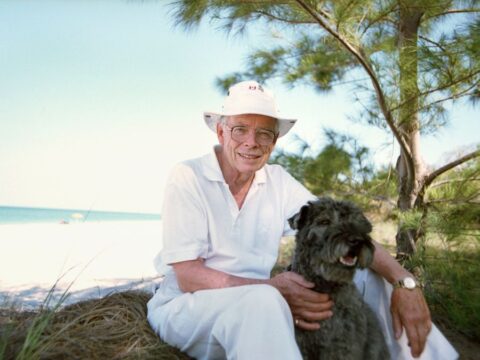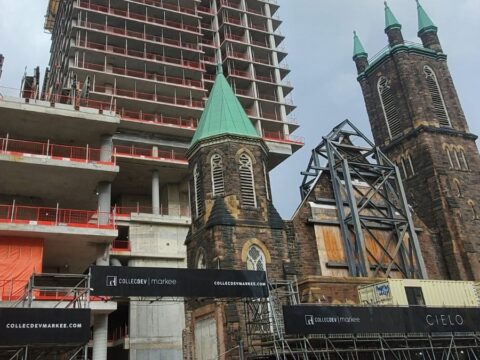On June 11, Rev. Charmain Bailey Foutner became the first Black woman — and, in fact, the first Black person — to be commissioned to diaconal ministry in the United Church. Before that, Rev. Marlene Britton had been the first and only Black diaconal minister — but she transferred from the Methodist Church in the Caribbean and the Americas.
They’ll soon be joined by Lisa Byer-de Wever, who is currently doing diaconal ministry in Montreal as the executive director of Saint Columba House. When she completes her studies at the Centre for Christian Studies, she’ll be the first Black woman born in Canada to be a diaconal minister.
You may unsubscribe from any of our newsletters at any time.
While there’s much to celebrate, there’s also the question of why this feat has taken so long. While 22.3 percent of the Canadian population identified as a visible minority in 2016, in a poll of ministry personnel conducted by The United Church of Canada in 2021, 8.5 percent of respondents identified as racialized. This problem of representation is even more profound in diaconal ministry, an ordered stream that focuses on community work, social justice and right relations.
What can The United Church of Canada learn from this occasion and from these three women?
With that in mind, they gathered together for a conversation, moderated by Broadview associate editor Julie McGonegal, where they celebrated their sense of call as diaconal ministers, but also talked candidly about their personal experiences of racism in the church and the changes needed moving forward.
Marlene Britton: Charmain, how does it feel to be approaching your time of commissioning during this historic time in the life of The United Church of Canada?
Charmain Bailey Foutner: I’m excited that I get to be a part of history in this way, but it’s tinged with sadness that it’s taken until 2022 for this to happen. In a lot of ways, I just want it over and done so that I can go on to my ministry that I’m really stoked about.
Marlene Britton: Tell me more about the sadness.
Charmain Bailey Foutner: I wrestle with why it’s taken this long. I know that there are Black women who began diaconal education but who didn’t complete it.
Does it have to do with Diakonia of the United Church of Canada [an association of practitioners of diaconal ministry in the denomination]? Is it not doing enough to reach BIPOC people in the church?
And then I wonder how much of it lies with us as Black people. Why do so many of us go into the ordained stream and not see this stream as one that speaks to our experiences? Diaconal ministry is a stream where we’re right there fighting for justice, justice in our communities and justice for the oppressed and excluded.
Lisa Byer-de Wever: It makes me wonder what barriers are in place, either visibly or invisibly, or ingrained in our culture, that have prevented Black people from following this stream of ministry.
Charmain Bailey Foutner: I want to ask you, Marlene and Lisa, what made you choose diaconal ministry? How did it appeal to you?
Marlene Britton: It’s not that I chose diaconal ministry, but that it chose me.
It was always clear that my call was to serve the church and serve God through the church, but to serve in ways that were on the margins of society — and to be present as a person of faith representing the church.
This context of Black people, and Black women, not being represented in the diaconate is representative of our church as a whole.
Charmain Bailey Foutner: What about for you, Lisa?
Lisa Byer-de Wever: Diaconal ministry called me — sometimes kicking and screaming, but God would not let me go. My whole life, it’s been either this or that, Black or white, but I think it’s the ministry of “and” that I’m called to. I live the experience of being too Black for white and too white for Black.
Charmain Bailey Foutner: I walked into a United Church 16 years ago because I was invited to sing. And the United Church gave me my spiritual life back. I thought, “This feels like a church that stands on its values.” But when I got called to ministry, I also came kicking and screaming — that is the last thing I thought I would do.
I remember when I read the description of diaconal ministry, I got so excited and thought “That is me.”
It sounds like we all recognized ourselves in diaconal ministry. So why does it not appeal enough to other Black people who are coming into ministry?
Marlene Britton: I am a relative newcomer to the United Church. I transferred from the Methodist church in the Caribbean in 2013. What I have found is that The United Church of Canada is wonderful in terms of being open, accepting, affirming and fully embracing of many cultures, ways of being and theologies. However, what we, as a church, declare from the rooftops and declare as a denominational stance isn’t necessarily being replicated everywhere on the ground.
It has taken much longer for our communities of faith to fully embrace differences in race and culture and ways of speaking.
This context of Black people, and Black women, not being represented in the diaconate is representative of our church as a whole. We are a small community of Black folks in this United Church of Canada.
Lisa Byer-de Wever: The barriers that we face — as Black people, as people of colour in the church — continue to occur on a daily basis. How do we address that? How do we create spaces to talk about that?
Below: How Charmain Bailey Foutner shook things up at one church as a student diaconal minister
https://twitter.com/CBCWindsor/status/1094941621811101699
I had a conversation the other day with two ministers who had been transferred into the United Church. The reality of their experience coming into Canada and being ministers here has been horrendous.
So it’s “Come on in. We’d love to have you, but just don’t be yourself. Please get rid of your accent. Please do not bring your type of music or your understanding of God to this space. Just conform.”
I think one of the hardest things about my experience of racism and discrimination is that it’s never acknowledged — and it’s easily dismissed. Sometimes it’s just too painful to talk about.
Charmain Bailey Foutner: It’s a question of how will my ministry be impacted. Will the people going forward with me in my ministry — those who read this article — interact with me differently? Will they be as open and honest?
Lisa Byer-de Wever: If you do talk about it, it affects your professional career in ways that you don’t even realize. Yet if you don’t talk about it, you’re not true to yourself, you’re not true to your call, and you pretty much erase everything that you value and have put your life into.
Charmain Bailey Foutner: I have been in countless situations where I know that the way I was treated was based on racism. But if we were to confront the people in these interactions, they would swear up and down that it wasn’t based on racism. It’s because I maybe said or did the wrong thing, or that I’m just a bad minister. But I know how I feel, I know how I was made to feel, and I know where it came from. So there is a white fragility factor here.
Marlene Britton: For me, the greatest challenge has been not being born here or raised in Canada. Coming into The United Church of Canada, and the country of Canada, as a woman in her 40s meant that I was already fully formed in a Black cultural context. Having to move into a culture that expected me to operate as a second-class citizen was significantly challenging. I have not succeeded in doing that. I haven’t been able to walk with my head bowed or shrink into a space.
More on Broadview:
- ‘I say with pride that I am from the favela’
- Canadian rapper Cadence Weapon is saying what others have left unsaid
- Black youth are helping United churches create a safe, diverse space
Lisa Byer-de Wever: Where do we begin on the diaconal part of it?
Marlene Britton: Diaconal ministers are seen as second-class ministers. Some of that is historical, because diaconal ministry emerged from the arm where women would be allowed to serve in leadership positions in the church. Also, the reality is that a lot of diaconal ministers are having to serve as ministers in churches. Because we are not ordained to Word and sacrament, it means that when we are appointed to those positions, we have to get special permission to administer the sacraments. That sets us apart, and not in a good way.
Charmain Bailey Foutner: There’s something that I want to name, and that’s that being Black, female and diaconal is a triple whammy. I remember being in a congregational meeting, and I suggested that the group look at the Affirm process. A white male got up in my face and yelled at me, “How dare you suggest this?” I was shaking. If I was a white female, he would not have talked to me the same way — and I know that because it took a white female to calm him down.
Lisa Byer-de Wever: It is a triple whammy. But it’s also a really unique perspective of being Black, female and diaconal.
Charmain Bailey Foutner: I realized that, going forward, I need to be able to work with an ally. If I have ideas, maybe I shouldn’t present them myself.
Marlene Britton: That’s the sad part of this conversation — that we have to be strategizing in this way in 2022 in The United Church of Canada. It’s why I say again that some of what we expound at General Council on a national level has not yet percolated into some of our communities.
***
This interview has been edited and condensed for length and clarity.
Julie McGonegal is an associate editor at Broadview.














